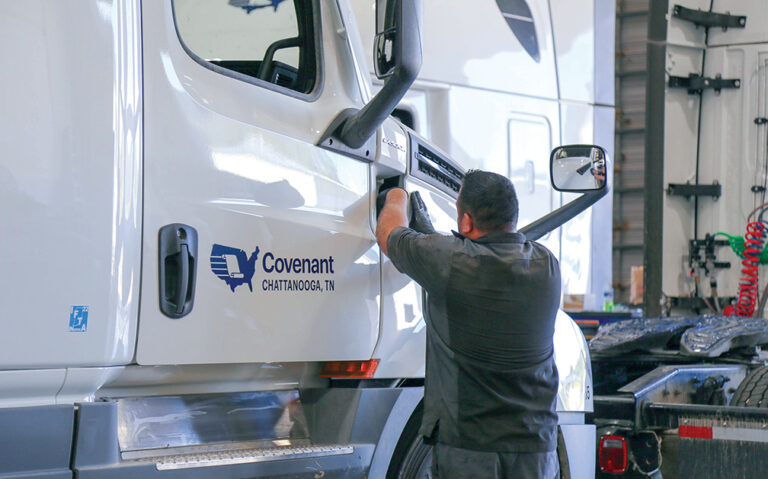Keeping trucks running safely and moving freight is always a formidable endeavor, but with 2023 looming ahead, the challenges seem enormous. New equipment can be difficult to come by. Many carriers have increased trade intervals, getting as many miles as possible from existing equipment.
Older equipment, however, usually requires more maintenance, a difficult proposition when supply chain issues limit the supply of available parts. Even when parts are available, finding qualified technicians to install them is another issue carriers are dealing with.
Dan Porterfield, who is senior vice president of maintenance and equipment control at Covenant Logistics, discussed some of the strategies he is using to keep Covenant’s 2,600 tractors running.
“It’s a very challenging environment for everybody,” he said. “We’re all running our fleets longer. We all know the supply chain has still not recovered. There are still labor issues.”
For Porterfield, it comes down to shop efficiency — and that means training.
“You really have to dig in on making sure they have all the knowledge and tools they need to replace the right part the first time, and not just chasing their tail on symptoms,” he explained. “I can’t go buy parts that don’t exist, but I can train technicians to make sure we’re not replacing parts that don’t need it.”
To facilitate training and the general flow of information, Porterfield changed the structure of Covenant’s maintenance team.
“We’ve broken our different groups of trucks into smaller groups based on business type or account and assigned a manager, what we’re calling a subject-matter expert, for those trucks,” he shared.
Employees who become subject-matter experts fill a quasi-supervisory role in the shop.
“We saw several years back, as equipment was becoming more complicated, with more sensors, more wiring or more electronics, that the diagnostics were becoming more challenging,” he explained. “We actually put in place a ‘master tech.’ His job is working with all the other technicians and then constantly training. Their sole focus is to be available to help technicians on diagnosis.”
The team is available by phone or via video chat so their expertise can be shared with technicians in maintenance facilities outside of Covenant’s main shop in Chattanooga, Tennessee. Technicians gain experience and knowledge and can then train at their own pace.
Another benefit of using subject-matter experts is the relationships they develop with the company’s operations team. Because they are assigned to a specific subset of trucks — for example, a group of dedicated accounts — they can focus on the peculiarities of that group such, as how many miles they run, how much idling they do and so on.
“Those team members are starting to develop some strong relationships with the operations group, with the managers responsible for the trucks,” Porterfield explained. “That results in more confidence that when their drivers have a problem, it’ll be taken care of. We’re not just calling Joe’s shop; we’re calling Joe. From the maintenance side, those relationships help make sure trucks get routed where they need to be for timely service.”
Porterfield began his career with Covenant in 1995.
“Fuel economy was down 3%, so I was the lucky college kid they hired to try and fix that,” he recalled. He worked his way through other maintenance positions, handling the breakdown team, parts, fuel and other tasks.
“I worked my way up,” he said. “I’ve been in my current role for three, three and a half years,” he said. He knows the carrier’s maintenance system top to bottom.
Like other carriers, Covenant uses trusted vendors for maintenance work when necessary.
“We rely on vendors a lot,” he noted. “But probably two-thirds of our trucks are operating in a dedicated environment, where it’s a smaller footprint. It’s difficult to open up a shop, so we depend on vendors.”
Maintenance operations need technicians to function, and Porterfield works to constantly bring in talent.
“We’re probably not at the point we’re at with drivers on the recruiting campaign, but we’re not far off,” he acknowledged. “We approach recruiting techs from the same standpoint.”
In addition to an active recruiting campaign, Porterfield works with local high schools to encourage students to enter the field.
“We make sure that we’re having conversations with students early on: ‘Hey, this is a really good career!’” he explained. “It doesn’t require you to go to college, so you can go to tech school and start your education there.”
Students who are especially interested might get the chance to try out the work before making a commitment.
“We do some internship programs and bring students in directly and work with them,” he said. “It doesn’t always work out, because they’re still trying to figure out who they are — but that’s fine.”
Another part of the recruiting effort involves technical schools.
“We work with tech schools and try to develop strong relationships there so we can recruit from among their graduates,” he explained. The key, he says, is to focus on those relationships.
“If you just kind of halfway do it, you don’t get much out of it. But if you really invest, those can pay off,” he advised.
Like many carriers, Covenant has struggled to get orders for new equipment filled.
“We didn’t get everything we wanted this year,” Porterfield noted. “We probably won’t get everything we want for next year. It’s still a very tight market.”
As in other areas, Porterfield leans on relationships to solve problems in acquiring equipment.
“You’ve really got to work close with your suppliers to get what you need,” he remarked.
Despite the complexities of the transportation business, Porterfield stays grounded in the basics.
“It’s still a people business,” he said. “You’ve got to have those connections with people to make it successful.”
Cliff Abbott is an experienced commercial vehicle driver and owner-operator who still holds a CDL in his home state of Alabama. In nearly 40 years in trucking, he’s been an instructor and trainer and has managed safety and recruiting operations for several carriers. Having never lost his love of the road, Cliff has written a book and hundreds of songs and has been writing for The Trucker for more than a decade.












I have read your blog about Fleet Maintenance: Relationships are key to keeping equipment running well at Covenant Logistics, which I have read for a long time. I know trucking insurance is one of the most talked about topics in the USA. The federal government has also made insurance mandatory which can be very difficult for some. I know a few tips to help you to reduce the costs. You can read what I have written at :
Commercial Farm Truck Insurance
I was a company driver with covenant last year and personally spoke with Dan after weeks of climbing up the maintenance ladder on every issue. For nearly two months I was stopped in shops,on a daily and weekly basis repairing trailers mostly and many times tires, once all 8 on a trailer ,usually 1 or a couple. I was called “not a team player” directly by my FM because of my constant concern for violations and safety when there was a loaded trailer going on.Like all major companies they were overloaded with trailer violations,drivers told me that they would not stop to fix trailers ,which is the norm at most major companies.I was trying to address ABS problems just befor ABS problems became a major brake violation which it can be when not diagnosted correctly.coveneant was buying used ,junk trailers I began to pick up loaded in the yards ,why I don’t know. Getting back to Dan ,yes , he;s one of the more concerned supervisors I contacted ,yet it’s a large company and drivers , mostly do not stop for violations.